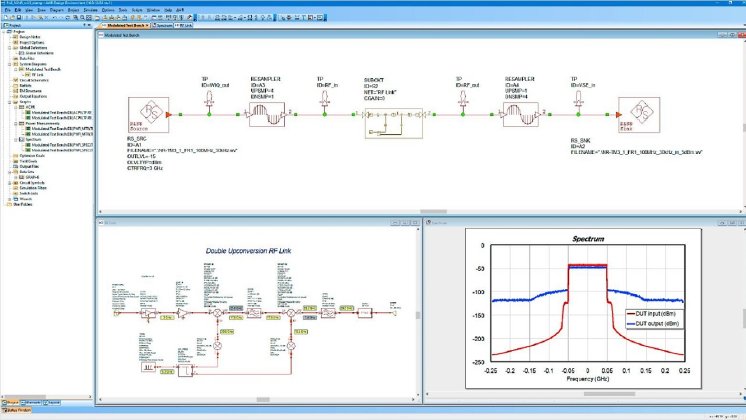New wireless and satellite technologies offer ever wider frequency ranges and involve increasingly demanding requirements. Realistic signal simulation at the early stages in RF system design is more important than ever. Using the same signal creation methods and analysis algorithms as for subsequent hardware testing enables direct result correlation from the early design stages to implementation verification, allowing conclusive and consistent analysis of widely used key performance indicators such as error vector magnitude (EVM).
To this end, Rohde & Schwarz has collaborated with Cadence Design Systems, Inc. to develop the R&S VSESIM-VSS signal creation and analysis tool, which supports all major standards such as 5G, the latest Wi-Fi evolutions and many more. The joint solution combines signal generation, design simulation and signal analysis, building on the strengths of either company′s popular and proven solutions. As a result, developers and design engineers benefit from an optimized tool that allows them to address design challenges earlier than before in the development process.
The R&S VSESIM-VSS signal creation and analysis tool functions as an addition to the Cadence® Visual System Simulator™ (VSS) software, a well-established solution for system simulation and modeling, particularly for RF components and RF assemblies used in wireless communications and radar design. R&S VSESIM-VSS from Rohde & Schwarz is designed to expand the capabilities of the VSS software by adding realistic signals to the workflow, increasing simulation accuracy and simplifying the design process. R&S VSESIM-VSS benefits from two established software tools from Rohde & Schwarz for testing operative circuits, modules and devices - the signal generation capabilities of the R&S WinIQSIM2 simulation software and the signal analysis capabilities of the R&S VSE vector signal explorer software. R&S VSESIM-VSS combines these functions and adds plug-ins for Cadence electronic design automation (EDA) tools.
The data sink plug-in from Rohde & Schwarz provides access to the signal at any point in the design process. The signal can be transferred to a vector signal generator and applied to available hardware, enabling system level analysis of hybrid hardware/simulated implementations. An important feature of R&S VSESIM-VSS is support of direct digital predistortion (DPD) techniques to verify the effects of linearization already in the simulation phase of power amplifier development.
An added benefit of combining the solutions is increased compatibility between Rohde & Schwarz and Cadence tools. Signal generation and analysis provided by the Rohde & Schwarz solutions can also be used in other connected Cadence products such as the Cadence Microwave Office® circuit design software or the Cadence Virtuoso® RF Solution for radio-frequency integrated circuits (RFIC) and RF modules.
Christina Gessner, Vice President Spectrum & Network Analyzers, EMC and Antenna Test at Rohde & Schwarz says: “Connecting EDA design simulation and test and measurement helps our customers achieve first-pass design success and shorter times to market. Using realistic signals, deriving common figures of merit such as EVM and understanding linearization capabilities even before tape-out means a competitive advantage for our customers. We look forward to bringing the results of our cooperation with Cadence to the market.”
Vinod Kariat, corporate vice president of R&D in the Custom IC & PCB Group at Cadence adds: “Customers developing RF frontend communication ICs and systems require access to the latest communications standards. The joint solution from our companies enables our mutual customers to accurately analyze standard compliant signals throughout the design phase, including final test validation.”
R&S VSESIM-VSS is available from Rohde & Schwarz. For more information visit the website: https://www.rohde-schwarz.com/applications/from-electronic-design-automation-eda-to-hardware-implementation-application-card_56279-1114370.html



